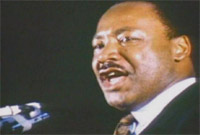 Mary Nelson just posted on MLK's Riverside speech, but I have some reflections to add. I'll admit that I took a "day off" yesterday instead of a "day on," making a four-day weekend backpacking trip in the Adirondacks with some buddies. But I did participate in some popular education on the van ride home yesterday, observing the occasion by playing two of the three MLK speeches I've been able to find for free online. I skipped ubiquitous and well-known "I Have a Dream" speech. We did listen to his "Mountaintop" speech, given the night before he was assassinated. Though it's more popularly known for the haunting forshadowings of this death-"I may not get there with you ..."-we were struck by its connection of economic to racial justice.
Mary Nelson just posted on MLK's Riverside speech, but I have some reflections to add. I'll admit that I took a "day off" yesterday instead of a "day on," making a four-day weekend backpacking trip in the Adirondacks with some buddies. But I did participate in some popular education on the van ride home yesterday, observing the occasion by playing two of the three MLK speeches I've been able to find for free online. I skipped ubiquitous and well-known "I Have a Dream" speech. We did listen to his "Mountaintop" speech, given the night before he was assassinated. Though it's more popularly known for the haunting forshadowings of this death-"I may not get there with you ..."-we were struck by its connection of economic to racial justice.
But "Beyond Vietnam" is worth a listen as a history lesson, as a challenge to the more domesticated gloss that gets applied to MLK's legacy every January, and perhaps most importantly as a continuing challenge to society and the church to take seriously the imperative of nonviolence: "We still have a choice today; nonviolent coexistence or violent co-annihilation." A few passages are familiar to me by now since they're the kind of things that we at Sojourners frequently quote. There's the painfully relevant assertion that:
America would never invest the necessary funds or energies in rehabilitation of its poor so long as adventures like Vietnam continued to draw men and skills and money like some demonic destructive suction tube.
And this warning:
I am convinced that if we are to get on the right side of the world revolution, we as a nation must undergo a radical revolution of values. We must rapidly begin the shift from a "thing-oriented" society to a "person-oriented" society. When machines and computers, profit motives and property rights are considered more important than people, the giant triplets of racism, materialism, and militarism are incapable of being conquered.
But those passages are primarily political. Listening yesterday, another passage jumped out that I was less familiar with-one that rooted King's nonviolence in his faith, and an important reminder to Christians that allegiances to political movements and divisions must fall beneath our allegiance to Christ:
This is a calling that takes me beyond national allegiances, but even if it were not present I would yet have to live with the meaning of my commitment to the ministry of Jesus Christ. To me the relationship of this ministry to the making of peace is so obvious that I sometimes marvel at those who ask me why I'm speaking against the war. Could it be that they do not know that the good news was meant for all [people]-for Communist and capitalist, for their children and ours, for black and for white, for revolutionary and conservative? Have they forgotten that my ministry is in obedience to the One who loved his enemies so fully that he died for them?
Ryan Rodrick Beiler is the Web editor for Sojourners.
Got something to say about what you're reading? We value your feedback!